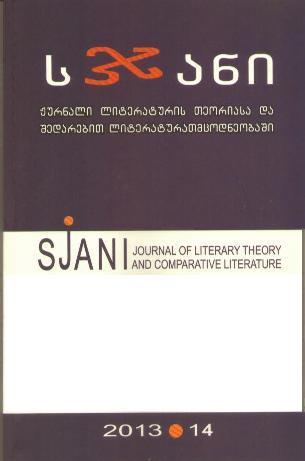ავტორი რეალიზმის ეპოქაში
The Author in the Epoch of Realism
Author(s): Solomon TabutsadzeSubject(s): Literary Texts
Published by: ლიტერატურის ინსტიტუტის გამომცემლობა
Keywords: realism; narrator; author.
Summary/Abstract: Solomon Tabutsadze (Georgia) The Author in the Epoch of Realism Summary Key words: realism, narrator, author. Creative output is the act of self-knowledge. Therefore, we can assume that while performing a creative act, a writer is creating his own personality as well. Working out its own aesthetic principles, each epoch forms a new type of authors. Whereas at the beginning of the Realism Epoch the parallelism of an author’s and a hero’s plans are preserved, and each of them are presented as subjects with equal rights, in analytical realism dating back in 1850s, a new inner standard appears in this aspect. It becomes extremely analytical and an author faces the challenge of observing a hero’s - as the intersection of a person and a character – outlook from an outside. This causes the alterations of inner criteria of a subjective sphere. A social, political and moral atmosphere of an epoch leads a writer to analyze a human. We can hardly call such a person, whose fate and destiny reflect all the characteristics of an epoch, a hero. It is no longer typical of him/her to be involved in large-scale activities, rebellion and conflict which equals to typicality. The creators of this epoch focus on another conception of a person – to depict everyday concerns – which is no longer the product of direct intersections of social and psycho-biological origins. The sign of the epoch Romantism - an image of an author, a narrator and, accordingly, the parallelism of a narrator’s and a hero’s spiritual-vital events - underwent the process of reduction during the analytical realism causing the origin of meta-narrating to weaken. A face of an author was replaced by an objective narrator with generalized expressions. Flaubert wrote about the status of a narrator that became an ideal:”An author must exist in his creation like God – he must be everywhere but must not appear anywhere”. A writer becomes interested in demonstrating a human’s versatile and various spiritual changes, which might not be reflected in social bonds. The nature of a human is more important than circumstances. Therefore, this process was called “Characterization” /”Characterologization” of Circumstances. Accordingly, characterological status of a hero is increased. As for an author’s “omniscience”, throughout analytical realism it drastically increases as well as the possibilities of its penetration in a personage’s consciousness. However, such kind of introspection has its limits, and this is a person’s inner core. The sign of restriction of an omniscience narrator’s power are those moments of a hero’s emotions and spiritual life the objectivation of which are denied by a narrator. A narrator’s selfrestriction is manifested in the following cite as well:”Many aspects and moments of life reflect only through sharing a hero’s view by a narrator” (Tamarchenko 1988: 185).
Journal: სჯანი
- Issue Year: 2013
- Issue No: 14
- Page Range: 14-19
- Page Count: 6
- Language: Georgian

